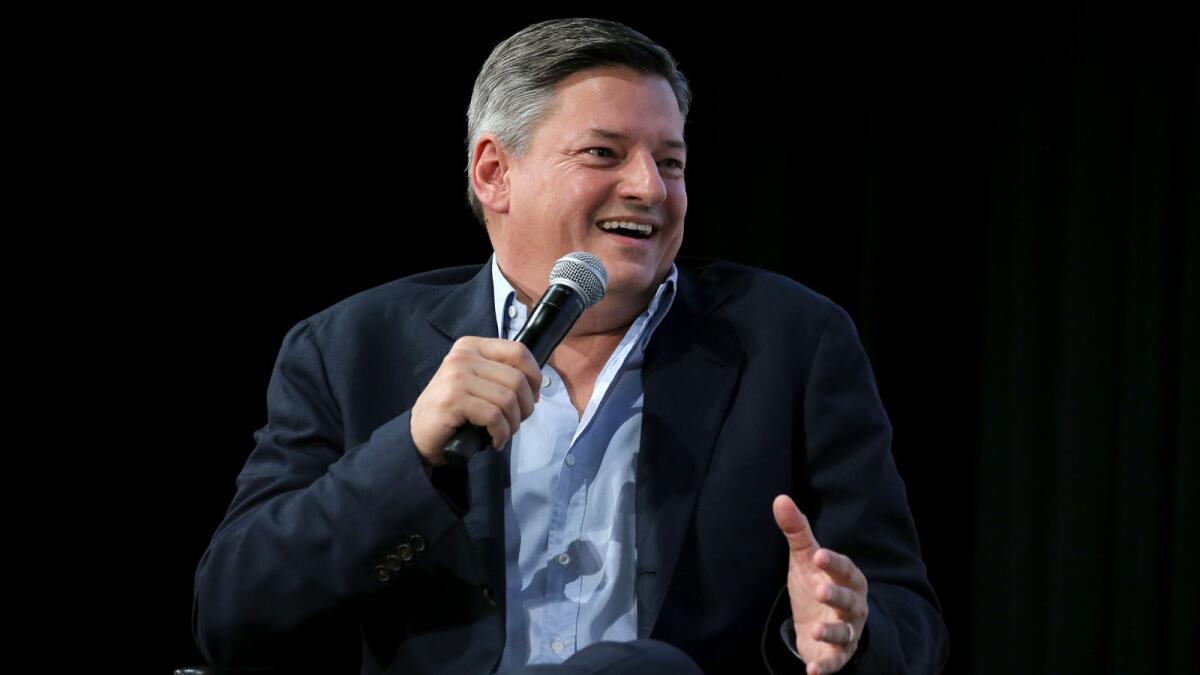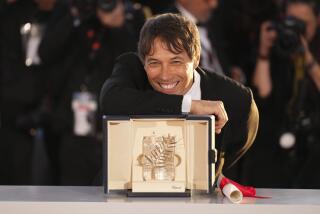Cannes 2015: Netflix comes to the Croisette, and sparks fly

Ted Sarandos: “People will still go to movies. But I think people want choice, and if you don’t give them choice it will only harm” studios’ interests.
New and old collided Friday at the Cannes Film Festival when one of Silicon Valley’s biggest entertainment players visited the bastion of traditional cinema.
Netflix Chief Content Officer Ted Sarandos took the stage at a venerable Cannes theater to explain the company’s strategy, after a year that saw the streaming service move full-on into the original film business.
He was received with a mixture of curiosity and, occasionally, hostility, as Netflix essentially issued a call from within the belly of the beast.
FULL COVERAGE: Cannes 2015
In the past year, Netflix has grown aggressive on the film front, signing a very pricey deal for a series of movies with Adam Sandler, partnering with the Weinstein Co. to make a “Crouching Tiger, Hidden Dragon” sequel and acquiring Cary Fukunaga’s finished film “Beasts of No Nation” for a planned award-season run.
Those efforts, greeted warmly by some sales agents and filmmakers for providing another content pipeline, have also been fretted over by many who see Netflix as a threat to a traditional business model they say works just fine.
Friday’s event, under the unusual Cannes billing of “Next,” turned most combustible not over issues of viewership figures or theater end-arounds — two of the more controversial issues in the U.S. — but on the question of European tax rebates.
Netflix’s critics have said the company’s increased global efforts could put local government-subsidized productions out of business across Europe. After a questioner in the audience took Sarandos harshly to task — he said the Netflix inroads would “destroy” the business — the executive fired back.
“I don’t think that’s true,” Sarandos said, as he referenced Netflix shows such as the local French series “Marseille.” “We won’t take one cent of French tax dollars to produce the show. I’m not saying it’s negative or positive. I’m saying it [the funds] will be irrelevant because we have a huge global footprint.”
The questioner pushed, and after some more back and forth, Sarandos received a boost from an unlikely ally: Harvey Weinstein. The Weinstein Co. principal was in the front row and came to his feet to defend Netflix, with which he has co-produced both film and television.
“They are visionaries,” he said of Netflix. “A million people in America watch French-language films” because of the service, he added, noting that “I hope the government spends money on hospitals and children. I hope the market is so good [films] don’t need government funds.”
Many of Sarandos’ remarks echo what he and other Netflix executives have been saying for some time: that the current system of “windowing” movies (essentially, delaying them until after their theatrical release) was outmoded and needed an overhaul. “It’s just too long. We live in an age when the Internet allows people to watch whatever they want whenever they want. Movies have been ... immune from that. We’re trying to change that.”
But if the message was familiar, the venue wasn’t.
Cannes is a place where all kinds of industry veterans come — certainly not just high-end directors and cinephiles — to do business at what’s informally known as “the market.” A sort of trade show that runs in parallel to the auteur screenings and red carpets, the market serves as a bazaar of international rights for many B pictures and below, and its not uncommon to see entertainment industry figures of all stripes in its ranks, including outsiders and upstarts.
But Sarandos’ keynote had a tonier feel, taking place in the elegant Bunuel Theater — shortly after, the venue would host Natalie Portman’s directorial debut, and Jane Fonda (star of Netflix’s “Grace and Frankie”) didn’t look out of place in the front row. The event even featured opening remarks from Cannes festival director Thierry Fremaux. (He called Sarandos the “future” but nonetheless pressed the assembled to question him on whether Netflix was undermining traditional theater-based cinema.)
The two French journalists interviewing Sarandos indeed pushed the issue, but Sarandos emphasized the company’s mantra that its streaming-first approach to new films does not preclude theaters from showing movies simultaneously.
“Nothing we’re doing is meant to be anti-theater or anti-cinema,” he said. “People will still go to movies. But I think people want choice, and if you don’t give them choice it will only harm” studios’ interests.
Theater owners have maintained that a system that allows movies to roll out in sequence across platforms remains the gold standard of Hollywood, embraced by consumers and helping to form a reliable business model for both producers and distributors.
Even more than in television, Netflix has been a smoke bomb to the film business, which relies on a complex set of revenue streams — theatrical but also the DVD, cable and other platforms collectively known as the back-end — to fund movies and recoup profits.
But as Sarandos acknowledged Friday, “there is no back-end” at Netflix, since the service retains all rights to its content.
Asked how filmmakers are then compensated, he said it was on the basis of “what we think the back-end” would be, though he didn’t offer many specifics when asked to explain how the company arrives at that formula.
“I know these are not popular sentiments, but this is the reality,” he said.
That the conversation took place at Cannes, a place that has long been the beachhead for the high-end theatrical experience did not go unnoticed by observers, and spoke to how much digital media and traditional cinema are interested in one other, if cautiously.
As an institution, Cannes is considered a stalwart advocate of the theater experience and generally takes a more careful approach to digital promotion, especially of the commercial front; unlike most festivals, for example, it’s uncommon to see hashtags or other digital exhortations on its screens.
Cannes is, however, a place that embraces independent film, and Sarandos made the case that his company has been a staunch supporter of the form, acquiring the documentaries “Virunga” and “The Square” and committing to independent scripted features (“Beasts of No Nation,” acquired in an expensive deal, fits the bill).
He also explained the company’s decision not to release viewership numbers to the public or producers — a policy that has angered many in a business that bases decisions on box office and TV ratings — because to do so would subject the company (and in turn lower-performing shows) to undue pressure if they weren’t immediately succeeding. The lack of disclosures does means high-quality shows can operate and be renewed free from Wall Street scrutiny, though whether such a reason is motivation for the secretive policy or merely a byproduct of it is a matter of debate.
While there seemed to be no specific agenda, Sarandos generally seemed keen to persuade the Cannes audience that Netflix’s foray into film is something the prestige film world shouldn’t fear. “In total, he said, “the movie business will be bigger, more movies will be made and more movies will be seen.”
More to Read
Only good movies
Get the Indie Focus newsletter, Mark Olsen's weekly guide to the world of cinema.
You may occasionally receive promotional content from the Los Angeles Times.










